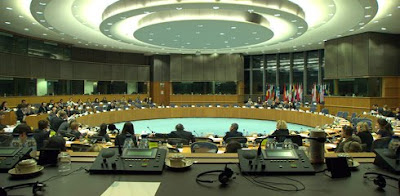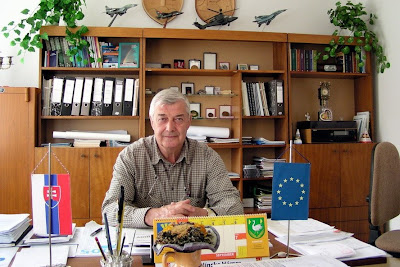
Typically, the best documentaries are the ones that make you look at something from a different angle, approach a situation or person in a way you never expected and even further educate you on a topic that you thought you already knew. For example, if you're Canadian, you may think you know the story of Wiebo Ludwig. If the name rings a bell or two, it is more than likely the warning kind that signals "crackpot". Director David York's current day look at the man, his closed community and the history of his battles with the oil companies drilling near his land may not completely change your view of Wiebo, but it might give you some insight into some of his actions.
Some background first...Ludwig was implicated in several oil pipeline bombings in Alberta and B.C. in the late 90s and involved in the shooting death of a young teenage girl on his property. He was charged and found guilty on several counts of vandalism that related to the explosions and served close to 2 years in prison before being released and allowed to return to his community's compound. The community is a devout Christian one that he has built up with several families and is mostly self-sufficient which allows them to stay insulated - apart from the occasional trip to town - from the rest of society. Of course, given that oil production is a big part of the economic engine in this region, many people weren't exactly happy with Wiebo's alleged involvement with those bombings and he and his family weren't overly welcomed in town. One night in 1999, a group of teenagers went joyriding on his property and before you could say "stupid prank gone wrong", a young girl was dead. As reported at the time, Wiebo came across as an eco-terrorist who had a borderline cult deep in the backwoods of Northern Alberta backing him up.

With a new series of bombings beginning in 2008, York brought his cameras into Ludwig's compound to attempt to get a better look at their secluded life and delve into both the new and old oil company issues. It doesn't appear that it will be a smooth ride at the outset, though, as York is questioned by Wiebo and his sons about his atheism: "What gives you the right to deny the existence of God?" asks one of them. This early going may not help change viewers' minds about Ludwig's apparent fundamentalist religious mindset, but as York seems to win their trust, religion recedes into the background during the rest of the film. Let me be clear: any intimations of Ludwig and his family being "crackpots" is NOT based on their specific religious views, but strictly on their reclusiveness combined with what was termed to be an extreme response to their fears of oil exploration.
Here's the thing though...Their fears end up being completely and wholly realized. Shortly after the initial drillings, sour gas leaks near their property were the likely causes of several illnesses in their families, dozens of miscarriages among the animals and 5 separate miscarriages by Wiebo's own daughters and daughters-in-law. In one absolutely devastating moment, home footage shows the family's funeral of a still born baby and the burial they give it. It is shocking, gruesome and deeply disturbing (I rarely turn away from images on the screen, but I couldn't handle this one for much more than a few seconds). Two days after that footage was shot several bombings (the ones Ludwig was eventually sentenced for) occurred at oil facilities. Though it could also be said that the footage exploits that particular tragedy, York has by this point put together (using current day footage as well as home documents from a decade previous) an interesting portrait of the community - the young women seem wonderfully sweet, they all provide for themselves and they appear to be quite happy. Combine this with numerous other facts about the case that never surfaced to the general population (e.g. the RCMP actually purposely staging an explosion as a means of accusing Ludwig to find out more information, etc.) and you begin to see why Ludwig is no big fan of oil drilling or the government. The news at the end of the film that new drilling is about to begin right near the community's water supply again is - especially as we hear Ludwig's tearful declaration to his family that they must endure - heartbreaking.
Nothing excuses many of Ludwig's actions. Whatever danger he and his family may have thought they were in from the joy riding teenagers, someone pulled that trigger and killed a young girl. As well, the bombings of private property were not only obviously illegal, but dangerous to many innocent people. After watching "Wiebo's War", I haven't changed my opinions on his actions or beliefs, but I'd like to think I've gained a better understanding of his point of view. Certainly the sign of a terrific documentary.















